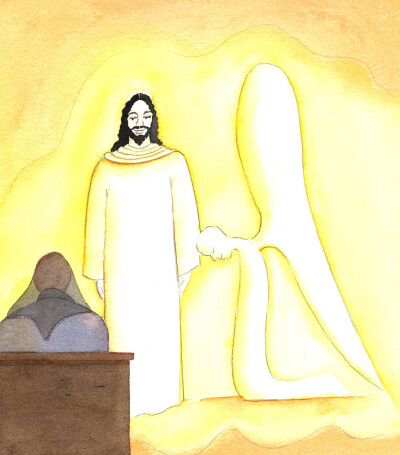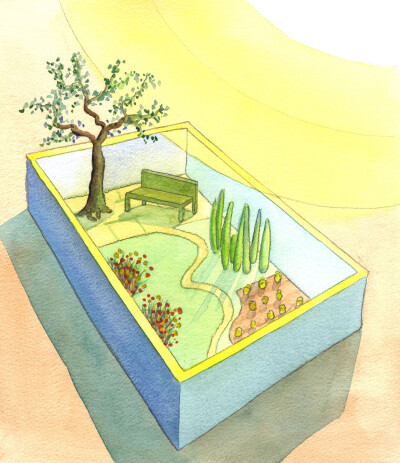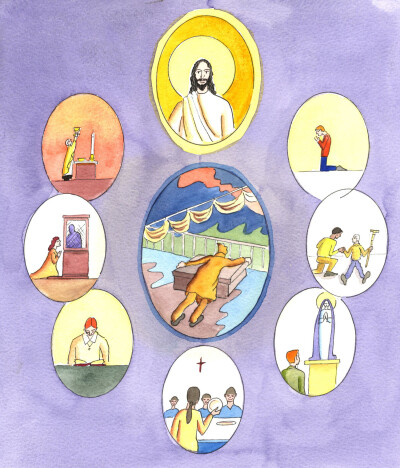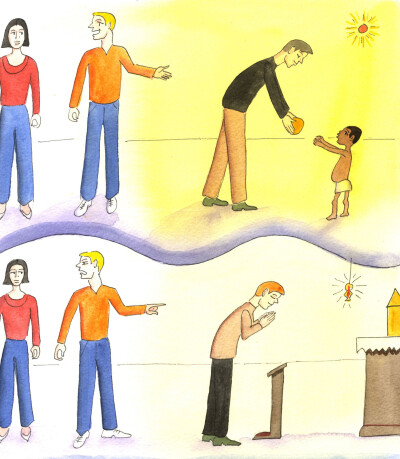Search Page
Showing 261 - 280 of 282
Really to love God is to prefer His Will to our ambitions. The Lord is glad to see a non-Catholic Christian come into full Communion with the Catholic Church. Yet from that 'spot' on the road there is a lengthy journey to be made, towards Heaven, and much to learn. Growth in faith, hope and love should be achieved, by God's grace, through prayer, spiritual reading, self-mastery, and acts of kindness, in humility, patience and trust.
We should follow the example of the holy Angels. When Christ comes to us in Holy Communion, or when we know He is Present in the tabernacle or on the altar, our attitude should be like that of the Angels, who adore Him profoundly, in His Divinity. He is worthy of their adoration, and ours. They never leave Him alone; and we, for our part, should always show Him reverence and love.
Some Catholics foolishly ignore the evidence; that the evil one has been especially active in the Church for four decades, determined to strike at Christ and Catholics by striking at the Mass. The evil one uses all sorts of people and methods to increase ignorance of the Real Presence, to confuse the laity, to discourage priests, to bring about a distorted or truncated presentation of the Faith in catechesis. It's as if he is lurking beneath a procession of the Blessed Sacrament, planning how to lessen our love for Christ and to diminish our fervour.
God knows all our needs, fears, hopes and joys. God asks us to live in a beautiful relationship with Him, now that we have been reconciled. He asks us to entrust ourselves to Jesus as comfortably as a tiny child entrusts itself to a good mother, never doubting that she is there to feed, console, hold and nurture him.
Christ knows that a person whose love for Him is sincere, who recognises the wonderful graces given to him, and realises his privileged state as a sharer in Divine life, is truly grateful; and such gratitude expresses itself in praise and thanks, offered to God with outward as well as inward expressions of reverence. A person who acts in this way opens his heart to receive an even greater number of graces.
When the Angels bow low, in awe, at the arrival of Jesus Christ, at the Consecration, they demonstrate, by their action, their interior disposition. We can do the same. We can express our adoration and love by reverent gestures, prayers, genuflections, and also by our silence in church, and our modest clothing, and dignified bearing.
If we have abandoned our sins, by God's grace, and if we love God, and arrange our day so that we offer frequent, sincere prayers, we can be sure that God looks upon our soul with delight. It's as if He sees a well-tended, well-watered garden, with weeds under control. We are free to choose one type of prayer or another, just as a gardener can choose to grow more vegetables than flowers. The Holy Spirit guides us.
By the intercessary prayers we offer 'in Christ', with faith, we can help to draw up souls closer to holiness and Heaven - even those who do not yet know or love Christ. This is true, so long as the person prayed for does not deliberately refuse the graces God sends her - as if cutting herself 'free' from God; and one who accepts grace finds its brilliance painful, perhaps, as it illuminates dark areas of his conscience and his daily life. It's as if he must shield his eyes.
Just as sailors at sea know how to 'batten down the hatches' and survive in a storm, because of some basic duties and basic wisdom, so must we hold fast to some Catholic 'basics' that will help us to remain faithful in all the storms of life. We need to know and love Christ, to turn to Him in prayer and in the Sacraments, especially the Holy Sacrifice of the Mass, and Confession. If we study the Scriptures, and ask for the prayers of the Saints and Angels, and show love to our families and to the poor, we do well.
Christ looks on with gladness when we keep His Commandments, out of love for Him; but it is a cause for sadness, in His sight, that many Catholics praise people who are fervent in obeying the second Great Commandment about love for neighbour, but are scornful about people who are fervent about the First Great Commandment, and who are concerned for the honour of God, the dignity of Catholic worship, and the faithful handing-on of revealed Truth. Those are even called fundamentalists!
All the Saints love to intercede for us; and all of the Saints have loved Christ; but if we wish to seek special help for the Church we are wise to ask for the help of those Saints who have had a special love for Christ in His Real Presence in the Blessed Sacrament - such as Saint Thomas Aquinas, or Saint Francis of Assisi who loved to prostrate himself in adoration before his Divine Saviour, in the monstrance.
Christ hears all sorts of prayers. Some people show their love for Christ by praying usually with very flowery language: very formal, or poetical or elegant. It springs from the traditions of their family or country. Others, brought up by plain-speaking parents, pray simple, honest, reverent prayers with no clever words but much love. We must not worry, about our simple prayers, since Christ said in the Gospel, 'Let your Yes be Yes and your No be No.' He likes our simplicity, just as He likes the beautiful words that other people offer, too.
Christ delights in the welcome He receives in Holy Communion from those who offer Him love, reverence and gratitude, and who turn to Him, Who is Really Present, to adore Him and confide in Him. How different is that sort of approach, from that of thoughtless Catholics whose minds are preoccupied with thoughts about nearby friends, or after-Mass activities.
We need to remember the Commandments: above all, about loving God, but also about loving our neighbour. Some people imagine it is no great wrong, to steal private property, but it can be as bad as physically assaulting the innocent, since it causes emotional damage and leaves people very afraid, even for years. Every thief should think about his likelihood of being saved.
Even in a vast area of the country, Christ sees that it is difficult to find ten just persons who love Him wholeheartedly, believe in all that He teaches through His Church, and persevere in prayer, and acts of charity. Many Catholics pray when it suits them, attend Mass infrequently, design their own moral code, and yet hope to drift into Heaven when they die. They trust in His love for them, but show little love for Him.
How to Pray: Catholic Devotions
This text is published as Chapter 6 of How to Pray (Part One: Foundations). An introduction to the life of prayer with much practical advice about how to deepen your prayer life.
6 ABOUT CATHOLIC …
Autobiography of Elizabeth Wang, Part 1
This text forms part of Elizabeth Wang's Falling in Love: A Spiritual Autobiography (1999). It tells the story of her life and of her spiritual journey as she came to know Christ and His Church.
You …
Autobiography of Elizabeth Wang, Part 2
This text forms part of Elizabeth Wang's Falling in Love: A Spiritual Autobiography (1999). It tells the story of her life and of her spiritual journey as she came to know Christ and His Church.
You …
Autobiography of Elizabeth Wang, Part 3
This text forms part of Elizabeth Wang's Falling in Love: A Spiritual Autobiography (1999). It tells the story of her life and of her spiritual journey as she came to know Christ and His Church.
You …
Autobiography of Elizabeth Wang, Appendix on Prayer
This text forms part of Elizabeth Wang's Falling in Love: A Spiritual Autobiography (1999). It tells the story of her life and of her spiritual journey as she came to know Christ and His Church.
You …
Showing 261 - 280 of 282














